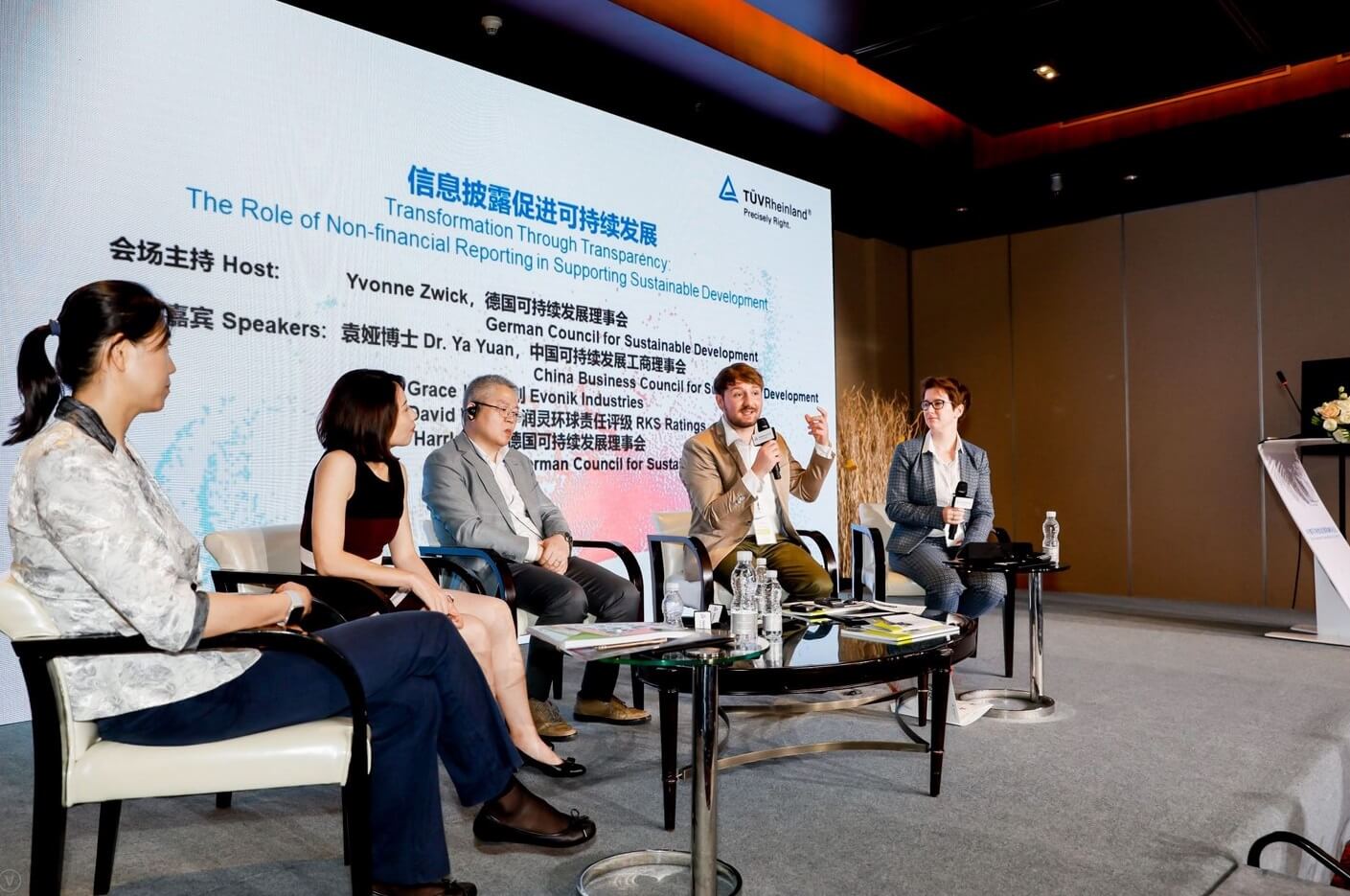The Sino-German Sustainability Summit held in Beijing highlighted parallels between the two countries regarding discussions of sustainable business practice. Various RNE initiatives have attracted the interest of the Chinese and could contribute to sustainable development in China, too.

Yvonne Zwick and Florian Harrlandt at the Sino-German Sustainability Summit in Beijing, Photo © TÜV Rheinland/Sino-German Sustainability Summit
Chinese and German sustainability stakeholders came together this summer to engage in dialogue – the Sino-German Sustainability Summit, which was held in Beijing at the end of June and was organised by TÜV Rheinland, and a business round table on the following day served as a forum for discussing urgent sustainability issues and possible joint contributions to the 2030 Agenda. The German corporate network Econsense and the German Council for Sustainable Development (RNE) were event partners.
For some years now, TÜV Rheinland has been organising regular summits in China on a variety of topics such as standardisation and quality management. This year’s focus was sustainability. TÜV Rheinland therefore brought the corporate network Econsense, the Sino-German Center for Sustainable Development (organised within the GIZ office in Beijing) and the agency Schlange & Co. on board as supporting organisers, alongside the RNE.
The meeting of approximately 260 Chinese and German sustainability stakeholders was also attended by two members of the RNE Office, namely Yvonne Zwick, RNE’s Deputy Secretary-General and Head of the Sustainability Code Office, and Project Manager Florian Harrlandt.
Fruitful dialogue
On the first day of the summit, Yvonne Zwick moderated a panel discussion on the topic of sustainable finance and, in the afternoon, a workshop on transparency and sustainable development. Florian Harrlandt gave a speech introducing the Sustainability Code. “The personal discussions we had were also interesting as they gave us insight into the challenges faced locally in China,” said Harrlandt. For example, there was very little recognition of the correlation between individual, healthy lifestyles and sustainability at the corporate level.
On the second day, a smaller circle of attendees convened for a round-table discussion, including representatives of businesses and civil society such as TÜV Rheinland, EY Germany, the Global Compact Network China, the Emerging Market Multinationals Network for Sustainability and Econsense.
Proportion of SMEs high in both countries
A surprising lesson learned over the two days was the fact that Germany and China face very similar challenges: “We were surprised by how many parallels could be drawn between the German and Chinese economic structures,” noted Harrlandt. Yvonne Zwick thus firmly believes these talks will serve to trigger ongoing dialogue.
In both countries, most of the major enterprises have already developed approaches with which to contribute to sustainable change. Equally, however, both countries have a high proportion of small and medium-sized enterprises (SMEs) within their economies and these still often see the Sustainable Development Goals (SDGs) as an abstract political concept with which they have few touchpoints. In the course of the Sino-German dialogue, both Ya Yuan, who works as a consultant to the China Business Council for Sustainable Development (CBCSD), and David Wang, General Manager of RKS Ratings, stated that a sound basis for sustainable development achievements by companies in China was still lacking.
Possible follow-up event in Germany
“It was a similar problem which prompted the RNE to facilitate a structured approach to sustainability reporting years ago in the form of the Sustainability Code,” explained Florian Harrlandt, who went on to say that it was therefore hardly surprising that the Chinese dialogue partners were interested in this instrument.
An array of other services and instruments which the RNE has already put to the test, such as the Sustainable Shopping Basket, the dialogue of mayors and the Regional Hubs for Sustainability Strategies (RENN), likewise caught the Chinese dialogue partners’ interest; they believe these could be applied in a modified form in China, too. There is also interest on both sides in consolidating this Sino-German dialogue and in holding a follow-up Sino-German Sustainability Summit in Germany.